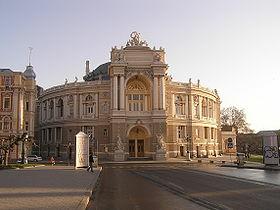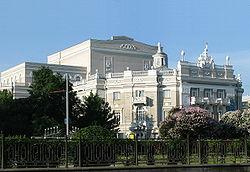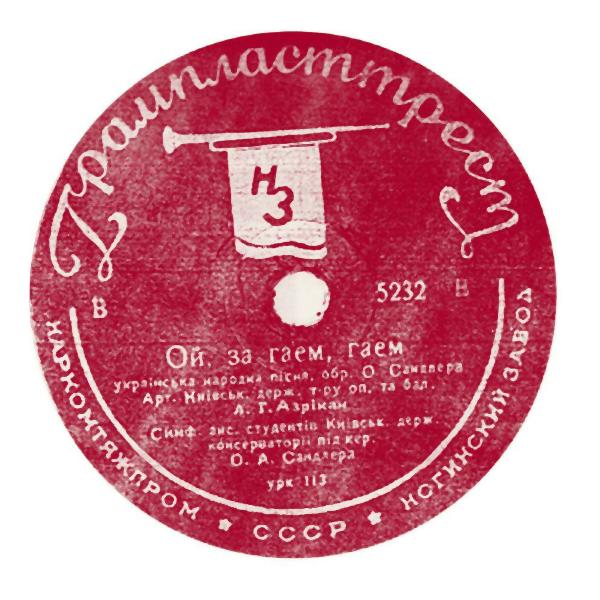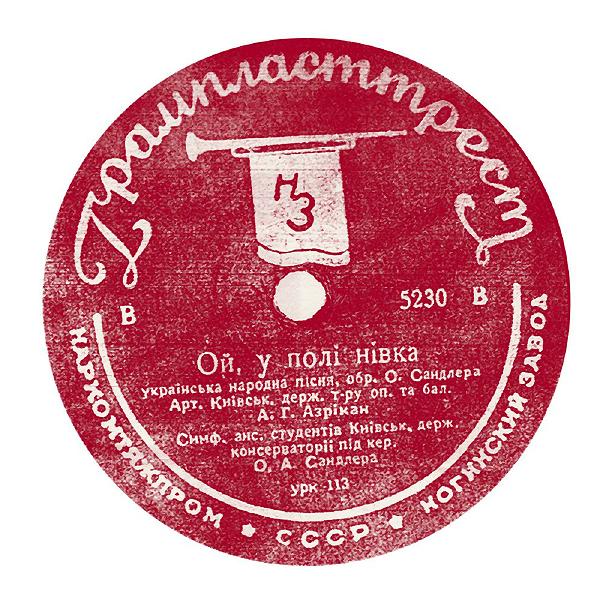Arnold Grigoryevich Azrikan
February 23, 1906 Odessa – July 19, 1976 Moscow
Azrikan began to sing at the age of twelve in the chorus of a church in Odessa.
A leading conservatory
professor, Menner-Kanevskaja, offered him free lessons, as he could not pay, in exchange for
Azrikan to take care of her huge garden. 1926 to 1929, he studied at the Odessa
conservatory, where he was coached by the singer Julia Rejder. Later, in Kharkiv, he would further study with Carlo Barrera,
the renowned Spanish (not Italian as usually reported) tenor and teacher. Azrikan began first as a chorister at the Odessa opera in 1926,
and in 1928 he made his debut there as Nathanael in Les contes d'Hoffmann.
 Odessa opera
Odessa opera
In 1930, Azrikan was invited to the opera theater in Kharkiv (the capital of Ukraine at that time) where he sang the Ukrainian,
Russian and Italian repertory. In 1934, both the capital and the opera theatre's best soloists, including Azrikan, moved to Kiev,
where he sang until 1943.
At the beginning of the war, Azrikan was evacuated together with the company to Siberia, then he became active with the brigades
touring the front lines and sang for the soldiers. In 1943, he recorded an aria for the film "Vozdushnyj izvozchik", aka Taxi to
heaven. In the same year, he joined the Sverdlovsk (Ekaterinburg) opera house,
where he achieved his greatest recognition as a dramatic tenor in Otello, a role that he had sung for the first time back in 1939 in Kiev,
sharing the role there with the great dramatic tenor Jurij Kyporenko-Domanskyj.
 Ekaterinburg opera
Ekaterinburg opera
Subsequently, Azrikan sang in Baku (1951–1956, 1961–1962), Odessa (1956–1959), and Chişinău (1963–1964).
In the late 40's, his name was suppressed from all official sources in the USSR in spite of having already been awarded communist
honours twice: Deserved Artist of Ukraine in 1940, Stalin Laureate (later called State Award) in 1946.
Azrikan was not a party member, a party that he did not like, and he was no informer like Nelepp. His name did not appear in
musical dictionaries such as the the Soviet Encyclopedia of Music or the Soviet Encyclopedia of
Theater, and only much much later, his name was finally listed in the Ukrainian Encyclopedia.
In 1956, he met the tenor Pechkovskij, who had spent ten years
in a Soviet gulag and could finally sing again in a limited way. Azrikan was one of the few not to ostracize
Pechkovskij upon his return.
Azrikan returned to the Odessa opera in the late 50's; a few years later
he had fallen out of favor with the opera administration. At that time Elena Cernei
came to sing Carmen and decided that she would choose who would sing Don José with her.
The management presented all the other tenors to Cernei, but she found Azrikan in his practice
room and chose him as as her partner. As a result, after the performances, Azrikan was sent to
the provincial town of Izmail, where he spent two years before being invited to join the
Baku Opera. He would never sing in Odessa again. He sang his last performance as Otello
in Chişinău in 1968. His career had centered at the Kiev and Ekaterinburg opera theaters, and later at the Baku opera. As a guest
artist, he performed all over the country.
Since 1964, Azrikan taught singing at the Chişinău conservatory. Azrikan was also a producer-director from 1951 onwards.
He directed:
Otello
Kujbyshev (Samara), 1950
Saratov, 1951
Baku, 1952
Chişinău, 1964
Iolanta
Baku, 1953
Manon Lescaut
Baku, 1956 (first time on the Soviet operatic scene)
In December 2006, his daughter and son published a memoir about him as their tribute to the singer's centennial.
The title of that book is "Arnold Grigorevich Azrikan: Romance for a dramatic tenor" (text in Russian and English)
Reference for biographical notes: Wikipedia
Discography
His voice was never widely
recorded; he made only one disc with two Ukrainian romances "Oj, za haem, haem" and "Oj, u poli nyvka" (1937, Gramplast, 5230/5232).


Other than that, Azrikan can be heard in the Russian wartime movie "Vozdushnyj izvozchik", now belonging to the Russian
National Treasures Fund. It is the story of a heroic military pilot in love with a beautiful
singer, who is also loved by a tenor. Since that tenor was played by an actor, Azrikan sang the arias instead of him.
In RA format
In RA format
These two Ukrainian songs were issued in Kiev on CD. Unfortunately
the transcription from the original record was made with inadequate equipment and had a lot of distortion. Tom Silverbörg
tried his best to get a better sound out of the distorted recordings. Here they are, until the original disc
can be found.
In RA format
In RA format
From the movie "Vozdushnyj izvozchik".
Repertory
Vladimir Igorevich (Knjaz Igor)
Vladimir (Dubrovskij)
Sobinin (Zhizn za tsarja)
Grigorij (Boris Godunov)
Andrej (Mazepa)
Vakula (Cherevichki)
Sadko (Sadko)
German (Pikovaja dama)
Ljonka (V burju/Into the storm by Khrennikov)
Godun (Razlom by Femelidi)
Grigorij (Tikhij Don by Dzerzhinskij)
Andrij (Taras Bulba by Lysenko)
Andrij (Zaporozhets za Dunajem by Hulak-Artemovskyj)
Petro (Natalka Poltavka by Lysenko)
Jontek (Halka)
Nathanael (Les contes d'Hoffmann)
Raoul (Les huguenots)
Faust (Faust)
Calaf (Turandot)
Radames (Aida)
Manrico (Il trovatore)
Canio (Pagliacci)
Arrigo (I vespri siciliani)
Cavaradossi (Tosca)
Don José (Carmen)
Pinkerton (Madama Butterfly)
Turiddu (Cavalleria rusticana)
des Grieux (Manon Lescaut)
Otello (Otello)
References
Russian
Agin, M. S.: Vokalno-entsiklopedicheskij slovar [Encyclopedic dictionary of vocalists], Moscow 1991, p. 15
Belza, I.: "Otello" v Sverdlovskom opernom teatre ["Otello" at the Sverdlovsk Opera Theater], Izvestija, April 17, 1946
Demijanenko, S.: Glazami rezhissjora [By the director's eye], Teatr i zritel, July 31, 1946
Ehbergardt, S./Porska, V.: Nash opernyj [Our opera theater], Ekaterinburg: Uralskoe literaturnoe agentstvo, 1998, p. 73–75 & 128
Grinberg, M. O.: Carmen, Realizme i opernoï uslovnosti, Sovetskoe Iskusstvo, February 22nd, 1939, p. 3
Maksimenko, V. S.: Dva veka odesskogo Gorodskogo teatra [Two centuries of the Odessa Civic Theater], Odessa 2005, p. 248
Maksimenko, V. S.: Gorodskoj teatr Odessy 1809–2009 [The Odessa Civic Theater 1809–2009], Odessa 2010, p. 177–179
Matafonova, Ju.: Vertinskij pisal o nem tak [Vertinsky wrote about him these words], Uralskij rabochij, April 27th, 2007
Min, M.: Radost pevtsa, Uralskij rabochij, July 3rd, 1946
Pozhar, S.: Luchshij Otello (Best Otello), Moldova, 5–6/2007, p. 19–21.
Vertinskaja, L.: Sinjaja ptitsa ljubvi [Blue bird of love], Moscow 2004, p. 168
Vutiras, Ja.: O druzjakh-tovarishchakh, Uralskij rabochij, 10/1974, p. 159
Zakharov, S. K.: Jubileju "Otello", Vechernij Sverdlovsk, June 28th, 1981
Ukrainian
Entsyklopedija sychasnoï Ukraïny [Contemporary Ukrainian encyclopedia], Kiev 2001, pt. 1/p. 229
Lysenko, Ivan: Slovnyk spivakiv Ukraïny [Dictionary of the Ukrainian singers], Kiev 1997, p. 10
Lysenko, Ivan: Ukrainski spivaky v spohadakh suchasnykiv [Ukrainian singers in the memoirs of their contemporaries], Kiev 2003, p. 531
Myttsi Ukraïny: entsyklopedychnyi dovidnik [Muses of Ukraine], Kiev 1992, p. 16
I wish to thank Dina Azrikan (the tenor's daughter) for the information, her book, the recordings and pictures.
|



